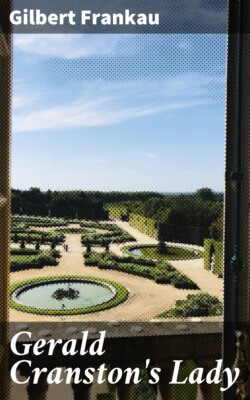Читать книгу Gerald Cranston's Lady - Gilbert Frankau - Страница 8
На сайте Литреса книга снята с продажи.
5
ОглавлениеTable of Contents
Except for his height, Gerald Cranston’s elder brother Harold, managing director of Cranston’s, Limited, resembled him hardly at all. Harold’s hair showed gray against Gerald’s tawn, his eyes gray-green against Gerald’s blue. He wore a rough bristly mustache on his upper lip, and his lower sagged a little for sign of ill-health. Plump of jowl where Gerald was lean, he had a forehead broad rather than high, puffy good-natured cheeks, and an easy-going dimpled chin. Cheeks and chin did not belie Harold’s temperament, which, as Gerald entered the sitting-room and the two clasped hands, further displayed itself in the jocular sentence, “Well—and how’s the blushing bridegroom?”
“Busier than his best man, apparently.”
“Same old Gerry!” The elder brother’s plump, ringless hand patted the younger on the shoulder. “Always overdoing it! Mark my words: one of these days, if you’re not deuced careful, you’ll have a nervous breakdown. I know I should if I went at things the way you do. I’ll have to talk to Lady H.—by the by, do I call her Lady Hermione or just plain Hermione?—about looking after you.”
“I shouldn’t if I were you, Harry.” Though he respected his brother’s grasp of business detail, Gerald Cranston considered him, in private respects, rather a fool—pleasant enough as a companion, of course, and loyal to the backbone, but otherwise a sentimentalist, an indisciplinarian, a man with no granite in his make-up; and that lack of granite seemed particularly apparent now, as Harold, obviously a little above himself with the excitement of the occasion, commenced an aimless monologue which began: “Old chap! It’s wonderful to think of you and me starting life in the old office at Leicester,” and continued, with a wave of the hand round the ornate sitting-room, “to end up here.”
“You’re more or less used to all this swank,” went on Harold. “I’m not; and I never shall be. Why—the mere idea of being best man at one of these la-di-da town weddings absolutely makes me sweat. Honestly, Gerry, if it hadn’t been for you and Mother making such a point of it, I’d never have come up last night. You’d have got somebody else easily enough. Why on earth didn’t you? I’m all right at organizing a mill, or a poster campaign. But this church stunt has got me beat. Tell me now, the lectern side’s yours, isn’t it? And the pulpit side’s hers? We wait for her in the chancel——”
“Don’t fuss, Harry,” interpolated the bridegroom. “Of course, the lectern side is ours.”
Harold Cranston, however, persisted with his aimless fussing while the bronze hands crawled slowly round the electric clock toward ten. “Marvelous chap, Gerry,” he thought, watching his brother’s impassive face. “He’s got a mind like a calculating-machine. Pull the lever, and out comes your answer. He’s like a machine altogether. It’s jolly difficult to imagine his being in love. I suppose he is In love; otherwise he wouldn’t be getting married. Jolly good stroke of business, all the same. Pretty woman, too; though she looks more than her age. I suppose she is only twenty-five. And he’s six and thirty. I wonder what she sees in him. Gerry’s not a bad-looking chap, and of course he’s got a bit of money. Still, you’d have thought she could have done better for herself—married one of her own set....”
Tillotson, entering with the news that “Mr. Jones is going straight round to see his client, and will take his chance of finding you here on his way back,” interrupted Harold’s monologue. But not Harold’s thoughts.
“Damme,” marveled Harold, when his brother ordered Tillotson to “Let the hall-porter know I’m expecting Mr. Jones,” “Gerry’s a most remarkable chap. If I were getting married within four hours, I shouldn’t be able to add up the petty cash. Let alone buy a house.”
Then Rennie announced “Mr. John Hardcastle”; and Harold marveled still further to hear his brother discussing his own will as calmly as though it had been a coal contract. “Gerry’s more than remarkable; he’s a perfect phenomenon,” mused Gerry’s brother, as Hardcastle—a short bald-headed little man with a Wellington nose and a face like brown parchment—spread out a thick typed document on the ormolu table and finally relinquished it with a Parthian, “You understand, Mr. Cranston, that you must defer your signature to this till after the ceremony? Otherwise, it won’t be valid.”
“Yes. Even I know enough law for that.” Mr. Hardcastle’s client handed the will over to his brother, saying: “Give me this immediately after the wedding, Harry. You realize, don’t you, why I’m leaving things as I am? By rights, I ought to make a settlement on the boy and on my wife. But I can’t do it at the moment. It’d tie up too much capital”; and without waiting for his answer, continued: “Mr. Hardcastle, I wonder if you have a moment or so to spare? If so, there’s another little matter, a matter of house property, on which I’d be glad of your opinion. It’s like this——”
Mr. Hardcastle obviously had several minutes to spare, and by the time he had spared them, Trollope’s Mr. Jones, bearded and in high fettle, arrived, in the company of Tillotson, with a pocketful of papers, which Cranston, even at first glance, saw included the receipt for his three thousand deposit.
Whereupon, after a short palaver, the depositor, surrounded by his secretary, his house-agent, and his solicitor, disappeared toward the office, leaving Harold alone.
“Phenomenon or no phenomenon,” thought the sentimental Harold, “a bridegroom’s a bridegroom; and I’ll bet even Gerry gets the wind up when he starts getting into his wedding-togs.”
